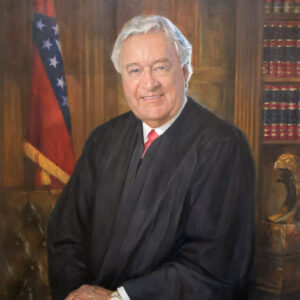calsfoundation@cals.org
Robert Hamilton (Bob) Dudley (1933–2023)
Robert Hamilton Dudley—who followed a lineage of lawyers, politicians, and judges—was a longtime trial judge and justice of the Arkansas Supreme Court. He retired in 1996.
Robert H. (Bob) Dudley was born on November 18, 1933, in Jonesboro (Craighead County), the son of Denver Layton Dudley, who was a lawyer, and Helen Paslay Dudley, a schoolteacher and clinical psychologist. An older brother died as an infant.
Dudley’s family had a long history in Arkansas. After fighting for the Confederacy during the Civil War, Dudley’s great-grandfather left Kentucky and settled in northeastern Arkansas at Piggott (Clay County). Dudley’s grandfather, Robert H. Dudley, was elected treasurer of Clay County in 1900, to the Arkansas House of Representatives for a single term in 1905, and to a term as circuit judge in 1916. His father, Denver Layton Dudley, was elected to a term in the House from Craighead County in 1924 and served as prosecuting attorney during the Great Depression in a district that stretched from the Missouri border into central Arkansas. Denver Dudley prosecuted two African Americans who were convicted of raping a white woman and were executed in the nationally infamous Arkansas “Scottsboro” Case in 1935. As a youngster, Bob Dudley was called “Little Judge,” owing to the family lineage.
Following the family custom, Dudley wanted to be a lawyer and politician. He spent a year at Arkansas State College (now Arkansas State University) in Jonesboro. His father’s friend Leslie Biffle, who was a former state Democratic Party chairman and later secretary of the U.S. Senate, got him a job in the Senate’s stationery office while he attended George Washington University in Washington DC. He returned to Arkansas and got a bachelor’s degree in history and, in 1958, a law degree from the University of Arkansas (UA) in Fayetteville (Washington County). He married Sally Wentzel of New York, and they had four children. The marriage ended in divorce in 1985.
After college, Dudley joined a former circuit judge, John L. Bledsoe, in a general law practice in Pocahontas (Randolph County). In 1964, he ran for prosecuting attorney for the five counties of the Sixteenth Judicial District and won handily. He served three terms and, in 1970, was elected judge for the Eighth Chancery District, which encompassed nine counties in eastern and central Arkansas. In 1980, he ran for an open seat on the Arkansas Supreme Court and again won easily. He was reelected without opposition in 1988 and retired at the end of the term in 1996.
His sixteen years on the Supreme Court saw the court render controversial and often politically unpopular decisions on constitutional questions, and Dudley was nearly always on the prevailing side. He concurred in the court’s order in DuPree v. Alma School District No. 30 (1983) that the state’s public schools were being operated illegally because the state had failed to provide the funds or a method of distributing aid to ensure that every child had a suitable education. Dudley said the legislature had failed to provide the funds and that it had to do so to meet its obligations under the Arkansas Constitution. Other decisions ordered Jennings Osborne, a wealthy Little Rock (Pulaski County) businessman, to remove a massive and popular Christmas light display that was a nuisance to neighbors (Osborne v. Power, 1995); invalidated the state’s antiquated use of revenue bonds for capital projects (Purvis v. City of Little Rock, 1984); struck down part of a constitutional amendment that limited the terms of members of Congress from Arkansas (which later went to the U.S. Supreme Court as U.S. Term Limits Inc. v. Thornton, 1995); interpreted the state’s new amendment liberalizing permissible interest rates on loans—Amendment 60—much more restrictively than the authors and the financial industry had intended (Bishop v. Linkway Stores, 1983); and removed constitutional amendments from the ballot if the ballot titles were confusing or misleading. In 1984, Dudley wrote the court’s split decision striking the “Unborn Child Amendment” from the general-election ballot because the name for the amendment and the ballot title were not neutral, as the Constitution required them to be (Arkansas Women’s Political Caucus v. Riviere, 1984).
Dudley retired at the end of his second term in December 1996 and continued to live in Little Rock. He married Mary Lynn Schwarz in 1991. He died on April 1, 2023.
For additional information:
“Chancellor, 46, Is Candidate for High Court.” Arkansas Gazette, February 26, 1980, p. 3A.
“Dudley, Hays Leading Races for Court Posts.” Arkansas Gazette, May 28, 1980, pp. 1A, 4A.
“Interview with Justice Robert H. Dudley.” Arkansas Supreme Court Project, Arkansas Supreme Court Historical Society. https://www.arcourts.gov/sites/default/files/oralhistories/Robert%20Dudley%20Interview.pdf (accessed April 3, 2023).
O’Neal, Rachel. “Ex-Supreme Court Justice Dies.” Arkansas Democrat-Gazette, April 3, 2023, pp. 1B, 2B. Online at https://www.arkansasonline.com/news/2023/apr/03/ex-supreme-court-justice-dies/ (accessed April 3, 2023).
Waller, Mark. “Court Honors Retired Justice Dudley.” Arkansas Democrat-Gazette, January 13, 1997, pp. 1B, 3B.
Ernest Dumas
Little Rock, Arkansas
 Divergent Prosperity and the Arc of Reform, 1968–2022
Divergent Prosperity and the Arc of Reform, 1968–2022 Law
Law Term Limits
Term Limits Robert H. Dudley
Robert H. Dudley 




Comments
No comments on this entry yet.